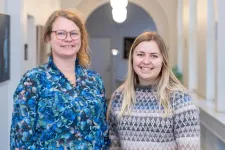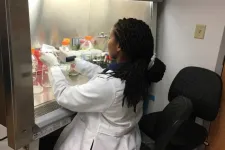(Press-News.org) Researchers have come one step closer to answering why, in some patients, a type of lymphoma changes from indolent to aggressive, and in particular they are closer to identifying which patients are at high risk of this change happening.
Part of the answer lies in the protein expression in the tumour, explains Associate Professor Maja Ludvigsen from the Department of Clinical Medicine at Aarhus University. Maja is one of the authors of a new study on the subject, which has just been published in the scientific journal Blood Advances.
Follicular lymphoma is an incurable lymphoma. But unlike many other cancers, it is not always aggressive from the start. This means that patients with the disease have to live with the uncertainty of when - and how - the cancer will develop. It also means frequent visits to hospital to monitor any acute developments.
Patients generally respond well to treatment and most are physically well, even with the serious diagnosis. However, for the majority of patients, the disease will flare up periodically and for some patients it will change into an aggressive form.
"For some, the disease can be controlled with treatment. For others, the cancer will progress to the aggressive lymphoma type, diffuse large B-cell lymphoma (DLBCL). This development is associated with a deterioration in the patient’s condition and the chances of survival are significantly lower," says Maja Ludvigsen.
The study was conducted by PhD student Marie Beck Hairing Enemark, and the researchers analysed the protein composition of cancerous tumours from patients with follicular lymphoma. This has provided new insights into why the cancer transforms into an aggressive type and, in particular, which patients are at high risk of being affected.
Can cause worry and anxiety
"You could consider the proteins in the tissue as the tumour's toolbox. Our study shows that tumours from patients who experience transformation to the aggressive type later in the course of the disease have a different protein content at the time of diagnosis. We can utilise this to find out more about the mechanism that drives the transformation. Interestingly, we found proteins that affect the cells' ability to survive," says Maja Ludvigsen.
"We therefore decided to take a deeper look at five proteins, and this confirmed a different level of expression in the tumour in patients with different disease progression. It is particularly interesting to note that, based on the combined expression of the five proteins, at the time of diagnosis we were able to identify patients who would later experience transformation to the aggressive lymphoma," explains the researcher. She calls the study a groundbreaking discovery about the biology of the transformation process in this type of cancer.
"At the moment, patients have to live with the uncertainty of when and how their disease will return. This can lead to high levels of worry and anxiety," says Maja Ludvigsen. She hopes that, in the future, the study can be used to predict the course of an individual patient's disease.
"This would mean that low-risk patients could be less concerned about their disease and it could save many unnecessary hospital visits. Perhaps it could even take some of the pressure off our busy hospitals. It will also be possible to tailor treatment strategies to high-risk patients earlier, ultimately with the hope of treating and saving a larger group of patients than is possible today," she says.
Maja Ludvigsen points out that, although the researchers have validated the results in tumour tissue from patients, further research is necessary to see whether the results also apply to a larger patient group. Expansion of the study has already been initiated as part of the research project.
The research results - more information
In a retrospective cohort study, the researchers investigated the protein profile in cancerous tumours using mass spectrometry-based proteomics analysis and immunohistochemistry (IHC) combined with digital image analysis.
The project is a collaboration across Blood Diseases and Department of Pathology, Aarhus University Hospital and Department of Clinical Medicine, Katharina Wolter, Amanda Jessica Campbell, Maja Dam Andersen, Emma Frasez Sørensen, Trine Engelbrect Hybel, Kristina Lystlund Lauridsen, Stephen Hamiton-Dutroit and Department of Pathology at Rigshospitalet, Copenhagen, Trine Lindhart Plesner and Department of Biomedicine, Aarhus University, Bent Honoré.
External funding: Karen Elise Jensen Foundation, Danish Lymphoma Group, Ølufgaard, A. P. Møller and Chastine Mc-Kinney Møller Foundation.
in the scientific article: https://ashpublications.org/bloodadvances/article/doi/10.1182/bloodadvances.2023011299/498309/Proteomics-identify-apoptotic-markers-as
Contact
Associate Professor Maja Ludvigsen
Aarhus University, Department of Clinical Medicine and Aarhus University Hospital, Department of Haematology
Mobile: +45 22 85 95 23
Mail: majlud@clin.au.dk
END
Research paves the way for predicting disease progression for incurable cancer
A research breakthrough in follicular lymphoma offers hope that doctors may be able to predict the progression of the cancer disease in individual patients
2023-12-12
ELSE PRESS RELEASES FROM THIS DATE:
Caring for LGBTQ+ nursing home residents in culturally appropriate and inclusive ways
2023-12-12
INDIANAPOLIS – There have been few studies of LGBTQ+ older adults residing in nursing homes. A new article from faculty of Regenstrief Institute and Indiana University explores care of the growing number of LGBTQ+ older adults living in these facilities. The paper highlights the experiences and needs of this population, outlines best facility practices and presents valuable resources for culturally appropriate and inclusive care.
Social isolation, limited community supports, dementia, decreased functional abilities, economic ...
Scientists patent new microphone inspired by spider silk
2023-12-12
BINGHAMTON, N.Y. -- By studying how spider silk responds to sound, researchers at Binghamton University, State University of New York have developed a patent for a brand-new microphone technology.
Using biomimicry as a model, Binghamton University Distinguished Professor of Engineering Ron Miles worked with then-doctoral student and current Assistant Professor of Mechanical Engineering Jian Zhou to patent a bio-inspired flow microphone — the very patent that has now been commercialized by the Canadian venture firm TandemLaunch and its spin-off company Soundskrit, which has also recently ...
Research team led by Dr. Gunisha Kaur wins 2023 National Academy of Medicine Catalyst Prize
2023-12-12
Anesthesiologist and global health expert Dr. Gunisha Kaur and her research team recently won a prestigious National Academy of Medicine (NAM) Catalyst Prize.
The Catalyst Awards are a branch of the Healthy Longevity Global Competition that seeks to expand the human healthspan—usually defined as how many healthy years a person lives—by rewarding cutting-edge ideas to improve the physical, mental, or social wellbeing and health of people as they age. Up to 20 awards are being given this year to United States-based innovators, out of 1,100 applications received from organizations focused on “science, medicine, ...
You can always become a better reader
2023-12-12
Our reading skills, and understanding of a text, depend on several factors.
“These include decoding texts, learning the letters of the alphabet, and knowing the different words and how they sound. However, vocabulary is also important,” says Professor Hermundur Sigmundsson at the Norwegian University of Science and Technology (NTNU) Department of Psychology.
He is behind a special edition of Frontiers in Psychology together with Professors Heikki Lyytinen from the University of Jyväskylä and Elena L. Grigorenko from the University of Houston.
Most people can learn how ...
New study sheds light on how much methane is produced from Arctic lakes and wetlands
2023-12-12
PROVIDENCE, R.I. [Brown University] — When it comes to greenhouse gases, methane is one the biggest contributors. Not only is it massively abundant — it’s about 25 times more potent than carbon dioxide at trapping heat in the atmosphere.
That makes tracking methane emissions critically important, and nowhere more so than in the Arctic, which is now the fastest warming part of the globe. A new study conducted at Brown University helps shed light on the actual atmospheric methane emissions from Arctic ...
Nearly 40% of Type 2 diabetes patients stop taking their second-line medication
2023-12-12
Two-thirds of patients discontinued their medication, switched to a different medication class or intensified their treatment
Discontinuation was higher (50%) among GLP-1 RA drugs, which are linked to gastrointestinal side effects
Findings could have implications for patients taking GLP-1 RAs to treat obesity
First large U.S. study to show such high discontinuation rates
CHICAGO --- Most patients with Type 2 diabetes will end up needing to add a second-line medication after metformin — the go-to primary drug for glucose management — ...
Black Medicare patients less likely to be referred for home health care
2023-12-12
Waltham — December 7, 2023 —
At discharge from the hospital, Black Medicare beneficiaries are less likely to be referred for home health care (HHC), compared to white patients reports a survey study in Medical Care. The journal is published in the Lippincott portfolio by Wolters Kluwer.
The disparity in referral for HHC among Black Medicare patients appears greatest among those with low "readiness for discharge" scores, according to the new research, led by Olga Yakusheva, PhD, of University of Michigan School of Nursing and School of Public Health.
Does ...
NEJM AI to educate clinicians about artificial intelligence applications in medicine
2023-12-12
BOSTON, December 12, 2023 — NEJM Group, publisher of the New England Journal of Medicine, today announced the launch of its newest title, NEJM AI, a peer-reviewed, monthly journal dedicated to the latest research and application of artificial intelligence (AI) and machine learning in medicine. In addition to original research articles, the journal publishes reviews, policy perspectives and educational material for clinicians, scientists, health care leaders, policy makers, regulators, and executives with pharmaceutical, device-manufacturing and technology companies. Benchmark data sets and protocols are ...
FAU lands USDA $1 million grant to create South Florida’s first microbiome innovation center
2023-12-12
In addition to being one of the largest, most diverse metropolitan areas in the world with a population of 6.1 million, South Florida hosts more than 9.7 million acres of farmland with a revenue of more than $7 billion in recent years. However, climate change, extreme weather events, poor soils, pests and disease, and workforce shortages present unique challenges in this region.
To address a critical need to train a diverse workforce with new sets of tools and skills to confront these emerging challenges, ...
Open Science momentum grows stronger in Canada with a new commitment by its largest mental health teaching hospital
2023-12-12
The Centre for Addiction and Mental Health (CAMH), Canada’s largest mental health teaching hospital in the country is pleased to announce that it has entered into a partnership with the Tanenbaum Open Science Institute (TOSI) at McGill University’s The Neuro, joining a growing alliance Canadian institutions changing research practices in neuroscience. This important endeavour is supported by a $1M commitment from the Tanenbaum Open Science Institute and an equivalent commitment by CAMH.
As part of its commitment to Open Science, CAMH is formally adopting a set of Open Science Principles to foster collaboration and the sharing of mental health ...
LAST 30 PRESS RELEASES:
Bug beats: caterpillars use complex rhythms to communicate with ants
High-risk patients account for 80% of post-surgery deaths
Celebrity dolphin of Venice doesn’t need special protection – except from humans
Tulane study reveals key differences in long-term brain effects of COVID-19 and flu
The long standing commercialization challenge of lithium batteries, often called the dream battery, has been solved.
New method to remove toxic PFAS chemicals from water
The nanozymes hypothesis of the origin of life (on Earth) proposed
Microalgae-derived biochar enables fast, low-cost detection of hydrogen peroxide
Researchers highlight promise of biochar composites for sustainable 3D printing
Machine learning helps design low-cost biochar to fight phosphorus pollution in lakes
Urine tests confirm alcohol consumption in wild African chimpanzees
Barshop Institute to receive up to $38 million from ARPA-H, anchoring UT San Antonio as a national leader in aging and healthy longevity science
Anion-cation synergistic additives solve the "performance triangle" problem in zinc-iodine batteries
Ancient diets reveal surprising survival strategies in prehistoric Poland
Pre-pregnancy parental overweight/obesity linked to next generation’s heightened fatty liver disease risk
Obstructive sleep apnoea may cost UK + US economies billions in lost productivity
Guidelines set new playbook for pediatric clinical trial reporting
Adolescent cannabis use may follow the same pattern as alcohol use
Lifespan-extending treatments increase variation in age at time of death
From ancient myths to ‘Indo-manga’: Artists in the Global South are reframing the comic
Putting some ‘muscle’ into material design
House fires release harmful compounds into the air
Novel structural insights into Phytophthora effectors challenge long-held assumptions in plant pathology
Q&A: Researchers discuss potential solutions for the feedback loop affecting scientific publishing
A new ecological model highlights how fluctuating environments push microbes to work together
Chapman University researcher warns of structural risks at Grand Renaissance Dam putting property and lives in danger
Courtship is complicated, even in fruit flies
Columbia announces ARPA-H contract to advance science of healthy aging
New NYUAD study reveals hidden stress facing coral reef fish in the Arabian Gulf
36 months later: Distance learning in the wake of COVID-19
[Press-News.org] Research paves the way for predicting disease progression for incurable cancerA research breakthrough in follicular lymphoma offers hope that doctors may be able to predict the progression of the cancer disease in individual patients





